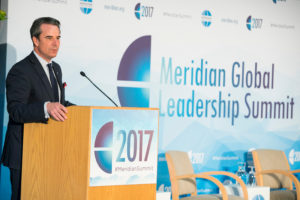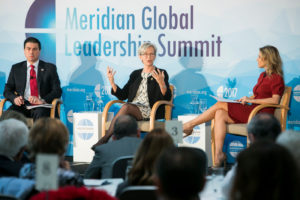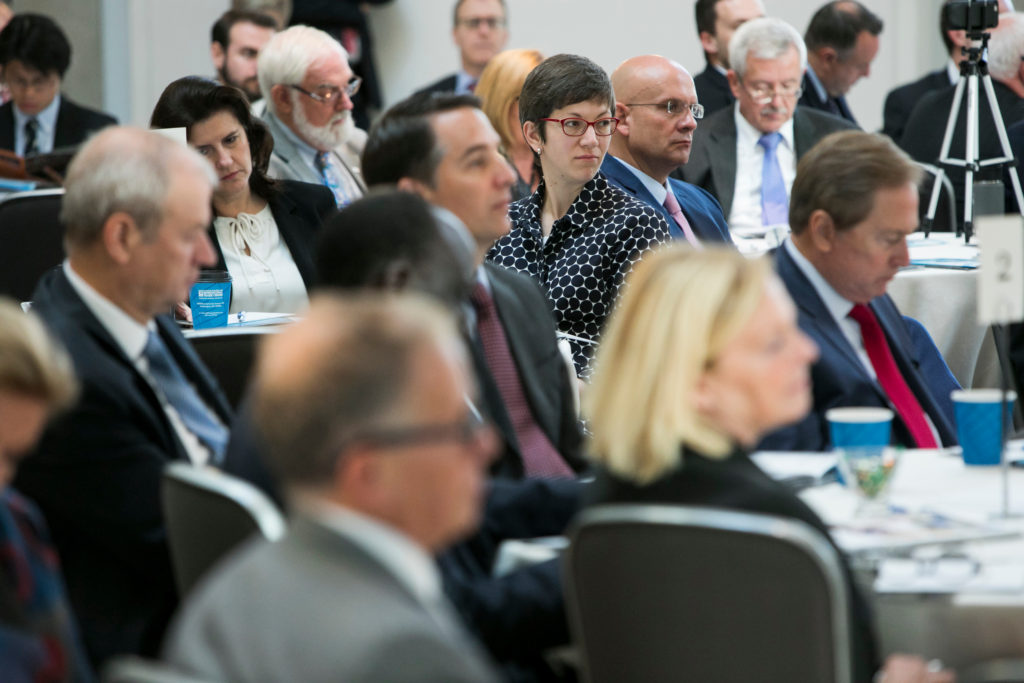As a newcomer to Meridian International Center, I was excited to attend my first Global Leadership Summit. Leaders in both the public and private sector gathered at the summit to discuss how to balance national interests and America’s patriotic values while embracing globalization. Throughout the morning, security emerged as a central theme to finding this balance. Specifically, the need to develop security between borders, within trade agreements, and across digitally connected systems. As a self-identified global citizen and someone with a daily dependence on technology, I was particularly eager to learn from political and business leaders about strategies to approach the advancement of globalization as well as the current state of cyber-security as digital avenues continue to grow and expand.

The summit’s first segment featured His Excellency Gerónimo Gutiérrez, Ambassador of Mexico to the U.S., and Her Excellency Kristi Kauppi, Ambassador of Finland to the U.S. Moderated by CNN’s Michelle Kosinski, the panel explored the challenges of securing borders during a time of massive immigration as a result of wars, violence and poverty pushing people out of their home nations. Ambassador Gutiérrez noted that border security is a major concern for Mexican and American citizens alike, and collaborative partnerships are therefore key to addressing this issue. “A strong and successful United States is in the interest of Mexico as much as a strong and successful Mexico is in the interest of the United States,” he said.
Ambassador Kauppi contextualized border security by explaining the influx of immigration to Finland in 2015. She said this rapid population change resulted in an increase in nationalist sentiments among Finnish citizens, who felt the European Union should have done more to strengthen the country’s external border. As a result, faith in multinational institutions diminished among native Fins – and unveiled resistance toward globalization. For Ambassador Kauppi, the 2015 incident illuminated the need for better communication between international institutions and citizens, particularly when it comes to issues of border security.

After the ambassadors’ panel, U.S. Congressmen Don Beyer (D-VA) and Ed Royce (R-CA) sat down with BBC anchor Katty Kay to explore security as it pertains to international agreements including NAFTA and the Iran Nuclear Deal. As a self-proclaimed internationalist, Congressman Beyer expressed concern about the possibility of the Trump administration pulling out of long-held international agreements. In the case of NAFTA, he alluded to the potential rise of China as the new leader of global trade if the U.S. were to exit the agreement. Congressman Royce, who also Chairs the House Foreign Affairs Committee, emphasized the need for global engagement, but also the need to revise trade agreements that don’t reflect the economic growth of countries since the agreements were first established. For Congressman Royce, international trade agreements should be developed by a “rules-based system with high (economic) standards for everyone.”
U.S. News and World Report’s Brian Kelly moderated the last panel of the summit, which brought together leaders in technology to examine the current state of cyber-security. The Information Technology Industry Council’s Josh Kallmer, First Data’s Ron Smalley, and MacAndrews & Forbes’s Frances Townsend discussed the reality of data breaches as well as the possibility for a paperless monetary system in the future. In light of the recent Equifax hack, Townsend and Smalley revealed that data breaches at banks and other information facilities occur more frequently than the public is aware. Banks and other institutions are not required to disclose the true magnitude of data breaches in an effort to protect their reputation with customers. In response to whether data breaches have become the norm, Smalley referred to his proactive development of defensive technologies that are helping protect private data and eventually will make hacks ineffective. When asked if society would eventually shift to a completely paperless monetary system, all three experts presumed no – suggesting that innovation in technology will continue to advance, but there will always be distrust of digital platforms.
By the end of the summit, I was bursting from the magnitude of thoughtful information. An entire day could have easily been dedicated to each panel. The summit truly provided me, and presumably our guests, with a behind-the-scenes look at some of the highest pillars of leadership.
















